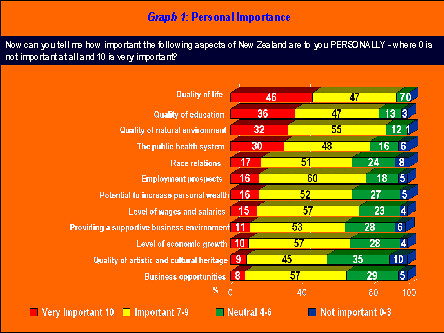Kiwipundit has an in-depth response to my post on growth and values. To respond to some of his points:
The graph shows that 67% regard economic growth as either very important or important, and only 4% regard it as not important. You can make anything seem unimportant if you rank it in a list that also includes things like health and quality of life. Countries with high GDP per capita have better health and education systems, cleaner environments, better working conditions and higher quality of life generally. The notion of a tradeoff between economic growth and other goals is misguided.
The GIAB analysts clearly believe that the "very important" results tell their own story, and I agree with them. There's an enormous disparity and clear demarcation between a top-tier of values (things like quality of life and the environment) and a lower tier. You can claim that this is because the top tier issues are just motherhood and apple-pie, but I'd say the same about economic growth - in fact, practically all the issues in that part of the survey were apple-pie. And what's clear is that we favour some types of apple-pie more than others.
However, support for economic growth is not just weak in relation to other goals; it's weak when looked at in isolation as well. Just look at the distribution of answers to the question of "how much do you support or oppose [economic growth] as a primary goal for New Zealand to pursue?" (this is on a 0 to 10 scale as before):

I'll let the report speak for itself here:
in response to a first up question about support for economic growth, New Zealanders generally responded in the affirmative. Their response has the character of 'polite support' and lacks passion. Graph 3 illustrates this point. Few register as opposed to growth, but a significant number are at the 'lukewarm' end of positive.
However, this apparent familiarity and support belies deeper concerns. Once questioned in depth, particularly in the focus groups, attitudes to economic growth become more fragile.
Whatever way you look at it, this is not good news for the proponents of growth uber alles...
I agree that countries with high GDP are generally better in all sorts of ways; the problem is that the policies promoted as giving New Zealanders a higher rate of economic growth (cuts in government services, lowering of the working standards and removal of environmental regulations) are seen as being highly destructive of the very things growth is supposed to deliver. This creates very definite tradeoffs - as does the sheer existence of multiple values. Denying that is simply denying reality. That said, it is not necessarily a zero-sum tradeoff, and policies may be found which both promote growth and our other values.
The survey respondents didn't say that income inequality was a negative effect. In fact the list of 'negative effects' includes 'more immigrants coming into New Zealand' and 'an improved balance between work and family life'. The 'negatives' label reflects the prejudices of the survey authors, not the views of the respondents.
I don't know where NRT gets his claim that 40% don't believe higher growth will deliver significant tangible benefits [...]
"A growing gap between rich and poor" (that's "income inequality" for those not in denial) was one of the two negative factors that was seen as more likely (as measured by number of "very important" respondents) than any of the positive factors, or indeed any other negative factor, the other being traffic congestion. It was identified as a negative effect by the initial focus groups, not by the survey authors.
(The inclusion of "work-life balance" in negative effects is I think due to concerns that growth would be destructive of that balance - that we'd all have to work harder. Interestingly, more people think that we will get a better balance than a worse one. This is perhaps something for the advocates for growth to work with...)
The 40% figure came from this part of the report:
The survey then looked at whether respondents believed growth would result in tangible benefits in such key indicator areas as better health and education, more secure jobs, more interesting and rewarding jobs, better pay and conditions of work. While a majority believed this would happen, a substantial minority, around 40%, is neutral or negative. This neutral/negative response climbs to around half when asked if growth will result in a better health system. This is a significant level of doubt making it difficult to build consensus messages around growth, as it is currently constructed or viewed.
KiwiPundit objects to my claim that "Politicians trying to sell economic growth and 'getting back into the top half of the OECD' as an end in itself are pushing shit uphill" by pointing out that "all parties except the Greens claim their policies will grow the economy". This is true - however, they're not all promoting it as an end in itself (maybe I should have emphasised that in the original). They're not all suggesting welfare cuts, reductions in government services, rolling back the ERA and RMA, and turning the whole of the West Coast into a giant open-cast coal mine. And that's where the difference lies.
Something I should have pointed out in the original is that the GIAB's take on this is actually quite positive, as can be seen from their conclusions and the subsequent press releases. They believe we can build a vision for (or version of) growth which supports and is supported by our values, rather than one which stomps all over them. "Kiwis will support growth if it supports Kiwiness" is one of their slogans, and it pretty much sums it up. That's a goal I - and even the Greens - support. The attitudes revealed here are only a threat if you believe that economic growth is fundamentally incompatible with, or should be pursued regardless of the cost to, our other values.


